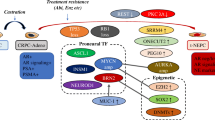Abstract
Altered expression of prostate tumor overexpressed-1 (PTOV1) is observed in various types of human cancers. However, the role of PTOV1 in epithelial ovarian cancer (EOC) remains unclear. PTOV1 messenger (m)RNA expression in EOC patients was evaluated by quantitative real-time PCR (qRT-PCR). PTOV1 protein expression was also analyzed in archived paraffin-embedded EOC tissues using immunohistochemistry (IHC), and its association with overall survival of patients was analyzed by statistical analysis. Results from qRT-PCR analysis show that the expression level of PTOV1 mRNA was significantly higher in tumor tissues of EOC, compared to that in adjacent noncancerous tissues (P < 0.001). IHC staining showed that high expression of PTOV1 was detected in 57.2 % (87/152) of EOC cases. High expression of PTOV1 was significantly associated with pathological grade (P = 0.029) and clinical stage (P = 0.001). Moreover, the results of Kaplan-Meier analysis indicated that a high expression level of PTOV1 resulted in a significantly poor prognosis of EOC patients. Multivariate analysis showed that high expression of PTOV1 was an independent prognostic factor for overall survival (P < 0.001). In conclusion, PTOV1 protein abnormal expression might contribute to the malignant progression of EOC. High expression of PTOV1 predicts poor prognosis in patients with EOC.



Similar content being viewed by others
References
Jemal A, Bray F, Center MM, Ferlay J, Ward E, Forman D. Global cancer statistics. CA Cancer J Clin. 2011;61:69–90. doi:10.3322/caac.20107.
Chen YL, Cheng WF, Chang MC, Lin HW, Huang CT, Chien CL, et al. Interferon-gamma in ascites could be a predictive biomarker of outcome in ovarian carcinoma. Gynecol Oncol. 2013;131:63–8. doi:10.1016/j.ygyno.2013.07.105.
White KL, Schildkraut JM, Palmieri RT, Iversen Jr ES, Berchuck A, Vierkant RA, et al. Ovarian cancer risk associated with inherited inflammation-related variants. Cancer Res. 2012;72:1064–9. doi:10.1158/0008-5472.CAN-11-3512.
Koyanagi T, Suzuki Y, Saga Y, Machida S, Takei Y, Fujiwara H, et al. In vivo delivery of siRNA targeting vasohibin-2 decreases tumor angiogenesis and suppresses tumor growth in ovarian cancer. Cancer Sci. 2013;104:1705–10. doi:10.1111/cas.12297.
Tsofack SP, Meunier L, Sanchez L, Madore J, Provencher D, Mes-Masson AM, et al. Low expression of the X-linked ribosomal protein S4 in human serous epithelial ovarian cancer is associated with a poor prognosis. BMC Cancer. 2013;13:303. doi:10.1186/1471-2407-13-303.
Marsh S. Pharmacogenomics of taxane/platinum therapy in ovarian cancer. Int J Gynecol Cancer. 2009;19 Suppl 2:S30–4. doi:10.1111/IEOC.0b013e3181c10513.
Kartalou M, Essigmann JM. Mechanisms of resistance to cisplatin. Mutat Res. 2001;478:23–43.
Morote J, Fernández S, Alaña L, Iglesias C, Planas J, Reventós J, et al. PTOV1 expression predicts prostate cancer in men with isolated high-grade prostatic intraepithelial neoplasia in needle biopsy. Clin Cancer Res. 2008;14:2617–22.
Santamaría A, Fernández PL, Farré X, Benedit P, Reventós J, Morote J, et al. PTOV-1, a novel protein overexpressed in prostate cancer, shuttles between the cytoplasm and the nucleus and promotes entry into the S phase of the cell division cycle. Am J Pathol. 2003;162:897–905. doi:10.1016/S0002-9440(10)63885-0.
Yousef GM, Luo LY, Diamandis EP. Identification of novel human kallikrein-like genes on chromosome 19q13.3-q13.4. Anticancer Res. 1999;19:2843–52.
Schierup MH, Mailund T, Li H, Wang J, Tjønneland A, Vogel U, et al. Haplotype frequencies in a sub-region of chromosome 19q13.3, related to risk and prognosis of cancer, differ dramatically between ethnic groups. BMC Med Genet. 2009;10:20.
Benedit P, Paciucci R, Thomson TM, Valeri M, Nadal M, Càceres C, et al. PTOV1, a novel protein overexpressed in prostate cancer containing a new class of protein homology blocks. Oncogene. 2001;20:1455–64.
Fernández S, Mosquera JL, Alaña L, Sanchez-Pla A, Morote J, Ramón Y, et al. PTOV1 is overexpressed in human high-grade malignant tumors. Virchows Arch. 2011;458:323–30. doi:10.1007/s00428-010-1018-1.
Lei F, Zhang L, Li X, Lin X, Wu S, Li F, et al. Overexpression of prostate tumor overexpressed 1 correlates with tumor progression and predicts poor prognosis in breast cancer. BMC Cancer. 2014;14:457. doi:10.1186/1471-2407-14-457.
Konstantinopoulos PA, Matulonis UA. Current status and evolution of preclinical drug development models of epithelial ovarian cancer. Front Oncol. 2013;3:296. doi:10.3389/fonc.2013.00296.
Acknowledgments
This research was supported by grant from 973 Foundation (2013CB531606).
Conflicts of interest
None
Author information
Authors and Affiliations
Corresponding authors
Additional information
Fei Guo and Liu Feng contributed equally to this work.
Rights and permissions
About this article
Cite this article
Guo, F., Feng, L., Hu, JL. et al. Increased PTOV1 expression is related to poor prognosis in epithelial ovarian cancer. Tumor Biol. 36, 453–458 (2015). https://doi.org/10.1007/s13277-014-2662-x
Received:
Accepted:
Published:
Issue Date:
DOI: https://doi.org/10.1007/s13277-014-2662-x




